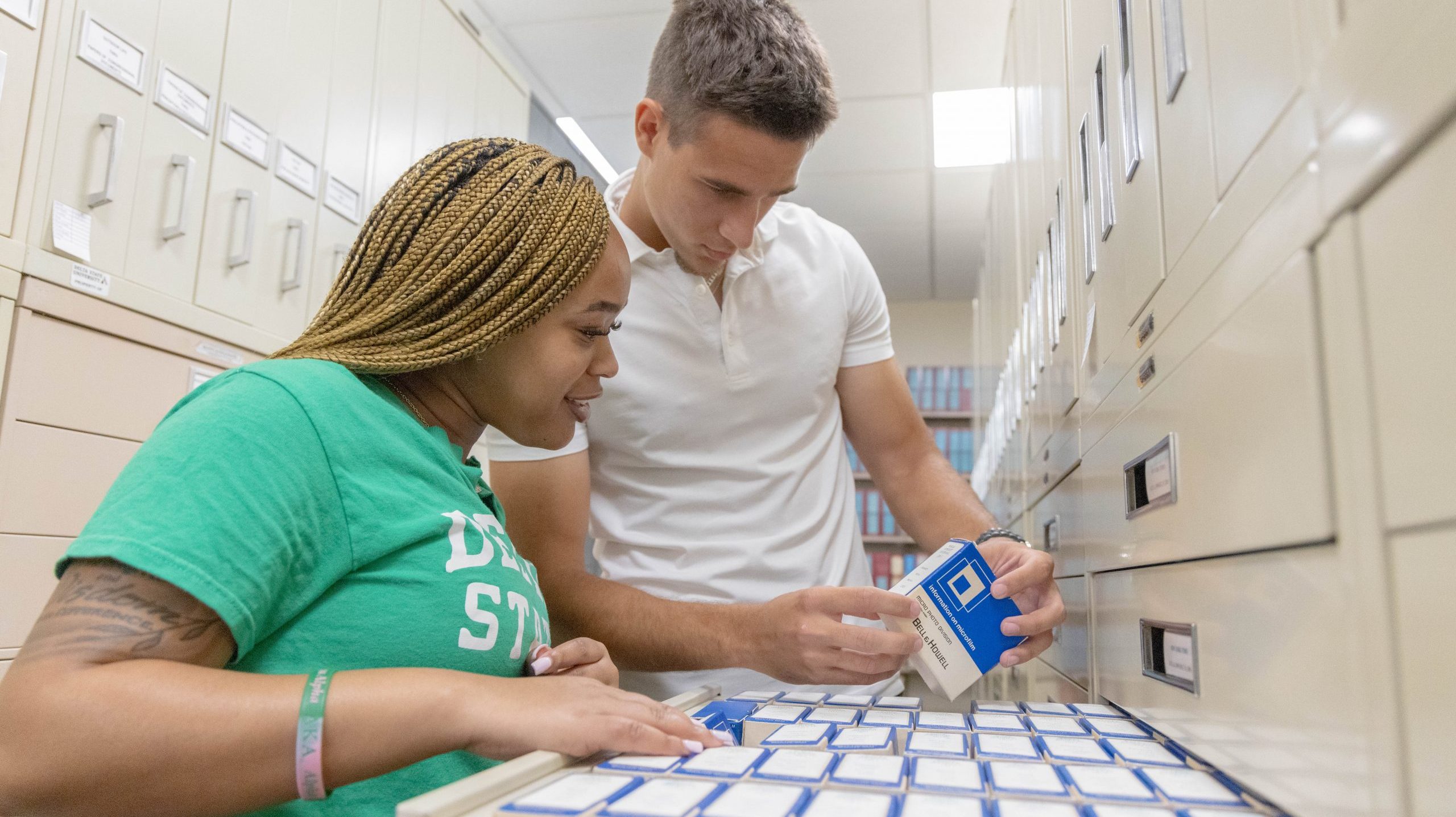The Master of Science in Criminal Justice and Criminology at Delta State University is a fully-online program designed for students who wish to take their career prospects to a higher level. The criminal justice field is in high demand and needs committed and talented individuals to lead it into the future. With the increasing complexity of the criminal justice system, the need for highly skilled professionals with advanced knowledge and expertise is on the rise. Pursuing a Criminal Justice and Criminology master’s degree online can help you stand out in a competitive job market and make a significant impact on the criminal justice system. Delta State also offers a Bachelor of Science in Criminal Justice and Criminology.
Online
Credit Hours
Year Program
Why Get a Master’s Degree in Criminal Justice and Criminology at DSU?
The Criminal Justice and Criminology master’s program at Delta State University is a special program that offers students a unique combination of academic and professional advantages. By enrolling in the program, you will gain a competitive edge in the criminal justice job market and develop the skills and knowledge necessary to make a positive impact on the field. Here are some reasons why you should consider enrolling in our program:
- Applications accepted year-round
- Full-time and part-time options
- Flexibility to complete at your own pace
- Individual student advisement
- A comprehensive curriculum
- Research projects
- Internship opportunities
- Experiential learning opportunities
- Prepares students for leadership roles
- Promotes ethical decision-making
What Can I Do with a Master’s Degree in Criminal Justice and Criminology?
Delta State’s Criminal Justice and Criminology master’s degree is designed to provide students with a broad range of career options within the criminal justice system. Students in the Criminal Justice and Criminology master’s program graduate feeling skilled, confident, and equipped to handle the challenges of the real-world criminal justice system. Our focus on practical skills and real-world experience ensures that our graduates are prepared to succeed in their chosen career paths. Our program prepares students for a variety of career paths within the field, including:
- Police officer
- Detective
- Special agent
- Correctional officer
- Probation officer
- Parole officer
- Private sector security manager
- Criminal justice researcher
- Criminal defense attorney
- Policy maker
- Prosecutor
- Judge

”Being a student in the Social Justice and criminology program was challenging and rewarding at the same time. As a full-time father and a state drug addiction officer, and a part-time Army National Guard soldier, I was able to reach my professional goals on a scheduled but flexible and capable online program. The program allowed me to broaden my knowledge and apply previous work experience and take something new into my future endeavors.
Willie Dunbar, Class of 2021Probation Officer, 14th Circuit Drug Court of the State of Mississippi
Graduate Funding Opportunities
At Delta State University, we understand the importance of affordable education. While we currently do not offer scholarships specifically for our Criminal Justice and Criminology master’s degree program, we do offer an affordable tuition rate with no additional fees for out-of-state students. In addition, we work closely with students to identify and apply for federal and state financial aid programs, as well as student loans and state scholarships. We are committed to providing our students with all of the tools necessary to succeed in business within multiple industries, including access to affordable education and financial support.
Program Goals
Students who graduate from the program will possess a comprehensive understanding of the criminal justice system and be prepared for successful careers in the field. Students will gain a solid foundation in criminal justice theory, research methods, and policy analysis. Students will also develop critical thinking, problem-solving, ethical decision making, and professionalism skills that are essential for success in the criminal justice field. The program provides opportunities for hands-on learning through internships, research projects, and other experiential learning opportunities that prepares students for leadership roles in the criminal justice field.

Admission Requirements
All students will meet all general requirements for admission to graduate school.
- Applicants with a minimum cumulative undergraduate GPA of 3.0 may be automatically admitted without additional requirements.
- Applicants with less than a 3.0 undergraduate GPA must:
a. Submit a resume and a list of three references from professors and/or employers familiar with the applicant’s academic or professional work.
b. Submit a personal statement/essay.
Curriculum
In the first semester of graduate study, students are expected to consult with the Coordinator of the Master of Science in Criminal Justice and Criminology program, who serves as the advisor for the students. The student will complete a plan of study wherein the coordinator will outline exactly what courses are to be taken and when, over the course of their tenure as a graduate student.
Students wanting to pursue Option A (thesis) or Option B (practicum) must have approval from the Graduate Coordinator and Chair of the Division of Social Sciences and History.
Option A (Thesis)
| Course Number | Course Title | Credits |
| Required Core Courses | ||
| CRJ 630 | Theories of Criminal Behavior | 3 |
| CRJ 650 | Organization and Philosophy of Criminal Justice | 3 |
| CRJ 655 | Professional and Institutional Ethics | 3 |
| CRJ 670 | Historical Analysis of the American Criminal Justice System | 3 |
| CRJ 675 | Seminar: Issues in Criminal Justice | 3 |
| SSC 570 | Methods of Social Research | 3 |
| SSC 669 | Quantitative Research and Statistics | 3 |
| Electives: Graduate CRJ, PSC, or SOC courses | 9 | |
| Thesis | ||
| CRJ 690 | Thesis | 6 |
| TOTAL | 36 | |
Option B (Practicum)
| Course Number | Course Title | Credits |
| Required Core Courses | ||
| CRJ 630 | Theories of Criminal Behavior | 3 |
| CRJ 650 | Organization and Philosophy of Criminal Justice | 3 |
| CRJ 655 | Professional and Institutional Ethics | 3 |
| CRJ 670 | Historical Analysis of the American Criminal Justice System | 3 |
| CRJ 675 | Seminar: Issues in Criminal Justice | 3 |
| SSC 570 | Methods of Social Research | 3 |
| SSC 669 | Quantitative Research and Statistics | 3 |
| Electives: Graduate CRJ, PSC, or SOC courses | 9 | |
| Thesis | ||
| CRJ 680 | Practicum | 6 |
| TOTAL | 36 | |
Option C (non-Thesis/non-Practicum)
| Course Number | Course Title | Credits |
| Required Core Courses | ||
| CRJ 630 | Theories of Criminal Behavior | 3 |
| CRJ 650 | Organization and Philosophy of Criminal Justice | 3 |
| CRJ 655 | Professional and Institutional Ethics | 3 |
| CRJ 670 | Historical Analysis of the American Criminal Justice System | 3 |
| CRJ 675 | Seminar: Issues in Criminal Justice | 3 |
| SSC 570 | Methods of Social Research | 3 |
| SSC 669 | Quantitative Research and Statistics | 3 |
| Electives: Graduate CRJ, PSC, or SOC courses | 15 | |
| TOTAL | 36 | |
Degree Requirements
A candidate for the Master of Science degree in Criminal Justice and Criminology is required to:
- Fulfill the general requirements for a graduate degree at Delta State University.
- Complete a minimum of 36 semester hours of graduate work as specified.
- Pass the comprehensive examination in the candidate’s major field administered by a committee of faculty. Each student is allowed three attempts at the comprehensive exam to be completed no later than three semesters after completing course requirements. Note: Students who elect to complete a thesis as a requirement for graduation are exempt from the final comprehensive examination.
Fees
This program will require an online course fee of $5/per credit hour.
Program Coordinator
Dr. Donna Ossorio
Assistant Professor of Criminal Justice and Criminology
P: dossorio@deltastate.edu
T: (662) 846-4065

